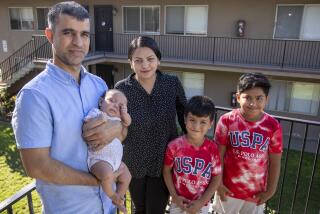Scripps Ranch Man Recounts Days as a Hostage
- Share via
When San Diego resident B. George Saloom, his wife and his eldest son arrived in Kuwait City last August, just hours after the Iraqi invasion of the country, they had no idea what was in store for them.
As a chauffeur drove them to their hotel, Saloom, in Kuwait to take a job with the Bank of Kuwait, thought it was a little unusual that so many soldiers would be wandering the streets.
“As we were driving to the hotel, we became acutely aware that something was amiss,” said Saloom, 42, speaking to reporters Saturday from his Scripps Ranch home, six days after his return to the United States.
“When we got to the hotel, we heard gunshots, and we asked the manager of the hotel what was going on and he said everything would be fine,” Saloom said with a slight chuckle, beaming in the glow of Christmas tree and television camera lights with his wife, Deborah, and youngest son, Nathan.
“The lobby of the hotel was completely enclosed by glass and so we rushed up to our rooms on the 10th floor,” Saloom said. There, “we saw helicopters over the (Persian Gulf), we saw two fighter aircraft with their missiles, we saw a lot of soldiers firing automatic weapons over people’s heads. . . . It was a sight.”
The Salooms spent 16 days in the Meridien Hotel in Kuwait City before moving to the U.S. embassy. Fifteen days later, Deborah, 39, and son, Preston, 18, were allowed to leave the country and return home, but it was only after much introspection that they agreed to leave their husband and father behind.
“The only reason I left was to get our son out,” said Deborah Saloom, who had to be treated for a kidney infection while being held as a hostage. Preston was in Rexburg, Idaho, where he is a student at Ricks College.
Without his family, Saloom occupied his days with exercise, reading, cleaning the embassy and prayer.
“I felt very separated, but not alone,” Saloom said of his days trapped in the embassy with 27 other American citizens and a Pakistani. “I knew that (my wife) was with me, even though she physically was not there.”
“A lot of people say ‘Why me, why am I here?’ ” Saloom said. “There are circumstances sometimes that are beyond your control, and you accept those circumstances and make the best of it, or the worst of it.”
Information, and occasional signs of hope, came from radio broadcasts by Voice of America and the British Broadcasting Corporation, Saloom said. But when word came of the Jan. 15 deadline set by the United Nations, the hostages seemed resigned to spending the winter holidays in the Kuwaiti desert, Saloom said.
Two days later, however, Saloom was taken to Baghdad by Iraqi troops on the premise that he would be released. But instead of being freed, he was taken to a chemical-medical factory, where he was held as a “human shield.”
Saloom said he was treated well and that his captors did not seem to be anxious participants in the affair.
“We didn’t talk too much about the war,” Saloom said. “The people were very sensitive and concerned with our welfare and they were as happy as we were to go home.”
Release came suddenly and surprisingly for Saloom, who spent only five days as a shield.
“I have a concern for the people who are Iraqi citizens who have nothing to do with the military. It’s a military state and they don’t have any authority over their country.”
But now, the Salooms are back together at home, and, they are the better for the experience.
“Maybe some of the things, the superficial things that were important fall away, and you go back to the basics,” Deborah Saloom said.
“It was a very difficult and trying time, but it was also a time of growth and opportunity for our family to be closer together,” George Saloom said.
More to Read
Sign up for Essential California
The most important California stories and recommendations in your inbox every morning.
You may occasionally receive promotional content from the Los Angeles Times.













